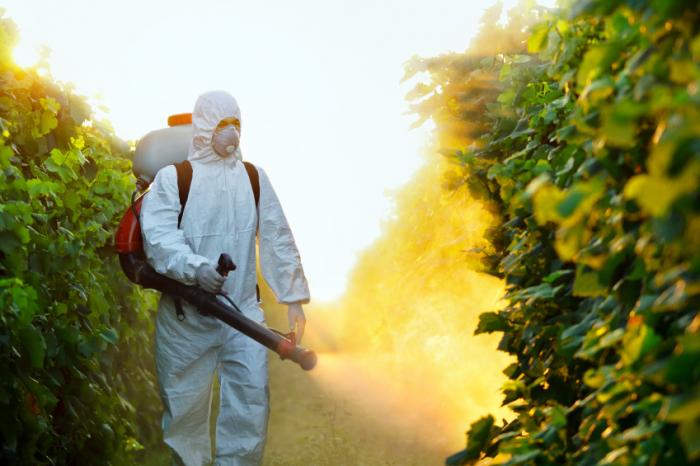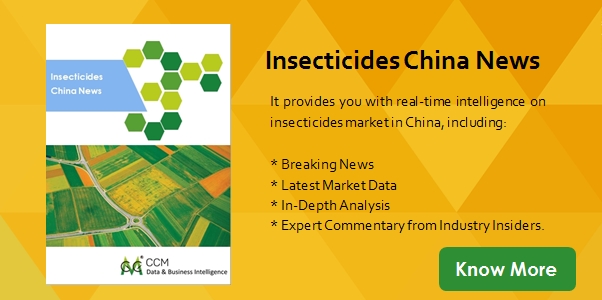Summary: It is an inevitable trend that
highly toxic pesticide would be eliminated step by step, and to research its
substitutes will be the focus work of pesticide manufacturers. They should pay
more attention to the market space after high toxic pesticides are banned from
using, and grasp the opportunity to promote the application and R&D of high
toxic pesticide substitutes.

Source: Internet
Staring from 1 Oct., 2015, the newly
revised Food Safety Law of People’s Republic of China would be put into effect
officially. The law stipulates a strict management on the use of pesticides,
and highly toxic and hypertoxic pesticides are forbidden from being using on
vegetables, fruits, tea and Chinese herbs. The implementation of this law
indicates that it is conducive to speeding up the elimination of highly toxic
pesticides. It is inevitable that highly toxic pesticides would be banned.
Pesticide manufacturers should pay attention to the impact of this law and
grasp the opportunity to seize more market share.
The usage of highly toxic pesticides
forbidden exerts impacts on pesticide industry:
-
Lowly toxic and highly efficient alternatives could get more market
share.
-
Pesticide manufacturers will be encouraged to adjust their product
structures.
-
Some highly toxic pesticide manufacturers would be eliminated from
the market, especially the small-sized enterprises which are backward in
production technology and management.
-
It will be beneficial for the consolidation and reorganization of
whole pesticide industry and promote the merger and acquisition of enterprises.
-
It will reduce the number of agricultural production accidents
brought about by highly toxic pesticides and avoid misunderstanding on
pesticide industry. It will also protect people’s health and protect the
ecological environment.
-
It will support the promotion and development of lowly toxic
pesticides and biological pesticides, especially providing a broad market for
the application of biological pesticides.
It is noted that the highly toxic pesticide
only account for less than 2% of the total consumption of pesticide, at
present. Besides, 12 highly toxic pesticides are still being use (not including
fruits, vegetables, tea trees and Chinese herbs). They are methidathion,
phorate, isofenphos-methyl,carbofuran, ethoprophos, aldicarb, aluminium
phosphide, omethoate, isocarbophos, endosulfan, methyl bromide and methomyl.
Industry insiders hold that the key of
replacing highly toxic pesticides lies in its efficacy rather than cost. It is
still impossible to ban the usage of highly toxic pesticides because no ideal
products with high efficiency have been found to replace them.
It is still necessary to use them and it
would be unrealistic to ban them completely. In fact, only highly toxic
pesticides could control and kill some pests. If we ban them completely, the
negative effects would be huge and the yield of crops would be reduced or some
crops even have no harvest.

Pesticide manufacturers should make efforts
in the following aspects in order to grasp the opportunity.
1. They should reduce the impact of
irreplaceable highly toxic pesticide on the environment and prolong its life
circle. They could adjust the formulation type of some highly toxic pesticide,
for example, highly toxic organophosphorus pesticides can be used as seed
dressing to protect crop seeds.
2. They should work hard to R&D ideal
substitutes. Though it would cost much time and money to develop new varieties,
the returns would be huge once it succeeded.
3. They could improve production technology
and management on the production lines of irreplaceable highly toxic
pesticides.
4. They should actively promote lowly toxic
pesticide and biological pesticides. More importantly, they should enhance
farmer’s understanding on the value and benefit of biological pesticides and
improve biological pesticide’s market space.
5. They should fulfill their social
responsibility, giving more guidance to farmers in application method of not
banned highly toxic pesticides, so as to let farmers use them in the right time
and in a proper way, thus accidents may be avoided.
About CCM:
CCM is the leading market intelligence
provider for China’s agriculture, chemicals, food & ingredients and life
science markets. Founded in 2001, CCM offers a range of data and content
solutions, from price and trade data to industry newsletters and customized
market research reports. Our clients include Monsanto, DuPont, Shell, Bayer,
and Syngenta. CCM is a brand of Kcomber Inc.
For more information about CCM, please
visit www.cnchemicals.com or get in
touch with us directly by emailing econtact@cnchemicals.com or calling +86-20-37616606.